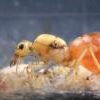- Formiculture.com
- Forums
- Gallery
- Members
- Member Map
- Chat

Eggs not developing. Help.
Started By
JackPearl
, May 25 2017 9:56 PM
8 replies to this topic
#1
 Offline
-
Posted May 25 2017 - 9:56 PM
Offline
-
Posted May 25 2017 - 9:56 PM
Hi guys I've had multiple founding Iridomyrmyx queens in Australia for over a month now, and non of the eggs have even made it to larvae stage, I don't heat them since when I did the next day all the queens had moved their eggs to the water side cotton of the test tube, so I thought they were uncomfortable, any help?
#2
 Offline
-
Posted May 25 2017 - 10:11 PM
Offline
-
Posted May 25 2017 - 10:11 PM
I had the same problem with a solenopsis xyloni queen Then she died after 2 months
#3
 Offline
-
Posted May 25 2017 - 10:13 PM
Offline
-
Posted May 25 2017 - 10:13 PM
I had the same problem with a solenopsis xyloni queen Then she died after 2 months
That's not exactly encouraging. Or helpful, but thanks.
#4
 Offline
-
Posted May 25 2017 - 11:17 PM
Offline
-
Posted May 25 2017 - 11:17 PM
Try not to disturb them. Avoid light, movement and vibrations. Sometimes they will eat their eggs and lay new ones, making it look like they are not developing.
But with that said, you are probably not doing anything wrong. I am not familiar with Iridomyrmex, but If they haven't made it past the larvae stage at this point, they are most likely not fertile.
Instagram:
nurbsants
YouTube
California Ants for Sale
Unidentified Myrmecocystus
https://www.formicul...ls-near-desert/
Undescribed "Modoc"
https://www.formicul...mp-ca-5-4-2017/
Camponotus or Colobopsis yogi:
https://www.formicul...a-ca-1-28-2018/
Camponotus us-ca02
https://www.formicul...onotus-us-ca02/
Unidentified Formica
https://www.formicul...l-ca-6-27-2020/
Pencil Case and Test Tube Formicariums
https://www.formicul...m-and-outworld/
Bloodworm Soup
https://www.formicul...bloodworm-soup/
#5
 Offline
-
Posted May 25 2017 - 11:18 PM
Offline
-
Posted May 25 2017 - 11:18 PM
Try not to disturb them. Avoid light, movement and vibrations. Sometimes they will eat their eggs and lay new ones, making it look like they are not developing.
But with that said, you are probably not doing anything wrong. I am not familiar with Iridomyrmex, but If they haven't made it past the larvae stage at this point, they are most likely not fertile.
But surely not all 7 of my queens are infertile but in the same predicament?
#6
 Offline
-
Posted May 25 2017 - 11:32 PM
Offline
-
Posted May 25 2017 - 11:32 PM
Last year, I found over a dozen P. rugosus without their wings, and none of them were fertile. They just kept laying eggs and didn't even die. Lived over a year. The other day I finally put them out of their misery and submerged them into isopropyl alcohol in a collection jar.
- Jelly likes this
Instagram:
nurbsants
YouTube
California Ants for Sale
Unidentified Myrmecocystus
https://www.formicul...ls-near-desert/
Undescribed "Modoc"
https://www.formicul...mp-ca-5-4-2017/
Camponotus or Colobopsis yogi:
https://www.formicul...a-ca-1-28-2018/
Camponotus us-ca02
https://www.formicul...onotus-us-ca02/
Unidentified Formica
https://www.formicul...l-ca-6-27-2020/
Pencil Case and Test Tube Formicariums
https://www.formicul...m-and-outworld/
Bloodworm Soup
https://www.formicul...bloodworm-soup/
#7
 Offline
-
Posted May 25 2017 - 11:44 PM
Offline
-
Posted May 25 2017 - 11:44 PM
Last year, I found over a dozen P. rugosus without their wings, and none of them were fertile. They just kept laying eggs and didn't even die. Lived over a year. The other day I finally put them out of their misery and submerged them into isopropyl alcohol in a collection jar.
So I guess back to square one?
#8
 Offline
-
Posted May 26 2017 - 1:07 AM
Offline
-
Posted May 26 2017 - 1:07 AM
What do I do with the queens if they're infertile?
#9
 Offline
-
Posted May 26 2017 - 5:47 AM
Offline
-
Posted May 26 2017 - 5:47 AM
I've found Forelius eggs develop poorly, if at all, below 78 degrees. They're a heat loving Dolichoderinae and Iridomyrmex may be similiar. When they move their eggs toward the water then that means they're utilizing the humidity gradient, which if anything is a good thing.
Edited by 123LordOfAnts123, May 26 2017 - 5:48 AM.
- dermy likes this
1 user(s) are reading this topic
0 members, 1 guests, 0 anonymous users















